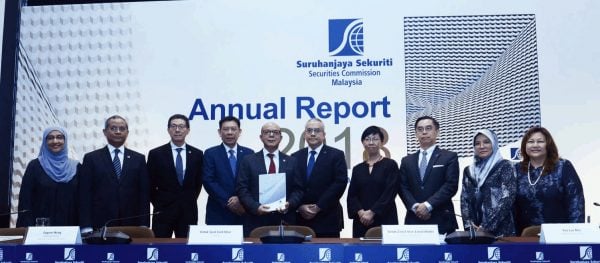According to the Securities Commission Malaysia in conjunction with the release of its 2018 Annual Report, the Malaysian capital market continued to play a key role in financing the economy against a backdrop of challenging global market conditions.
“Though occasionally tempered by uncertainties stemming from rising trade tensions and tightening global financial conditions, all segments of the Malaysian capital market remained resilient, which is a testament to the safeguards implemented by policymakers and market participants,” elaborated SC Chair Datuk Syed Zaid Albar. “On our part, the SC needs to continue being progressive, collaborative, open in discussions and proactive in our approach with all stakeholders. Ultimately, the SC must act as a catalyst to help the market evolve.”
The size of the capital market reportedly remained above RM3 trillion as at end 2018, with the bond market growing by 8.8% to RM1.4 trillion while equity market capitalization contracted by 10.8% to RM1.7 trillion. Meanwhile, the fund management industry had RM743.6 billion in assets under management, and the unit trust industry recorded net asset value of RM426.18 billion in 2018.
 The capital market continued to be a key source of financing for the economy, with total funds raised amounting to RM114.6 billion.
The capital market continued to be a key source of financing for the economy, with total funds raised amounting to RM114.6 billion.
Alternative fundraising channels, namely venture capital, private equity, equity crowdfunding, and P2P financing, raised RM 808.4 million (USD $197.7 million) in funding, illustrating the capital market’s ability to play a significant role in the funding needs of underserved issuers such as micro, small and medium enterprises.
According to the report, Malaysia remained a global leader in the Islamic capital market (ICM) with RM1.9 trillion in Shariah-compliant equities and sukuk outstanding. Malaysia also continued to be the world’s largest sukuk market.
Building on Malaysia’s strength in the Islamic capital market, the SC continued to lead initiatives to establish Malaysia as a regional leader for Sustainable and Responsible Investment (SRI) in 2018. Following the issuance of the world’s first green sukuk in Malaysia in 2017, the SC established a RM6 million Green SRI Sukuk Grant Scheme in 2018 to incentivize issuers by offsetting up to 90% of external review costs incurred in relation to the issuance of green SRI sukuk. Four applications have since been approved, supporting RM2.2 billion in funds raised to facilitate the financing of projects that benefit the environment and society.
 To meet the demands for convenient and affordable investment products and services, the SC licensed Malaysia’s first digital investment manager in 2018. Building upon the strong momentum in facilitating inclusive and sustainable growth, additional Fintech providers including ECF, P2P & digital asset exchange operators and digital investment managers are expected to be operational in 2019.
To meet the demands for convenient and affordable investment products and services, the SC licensed Malaysia’s first digital investment manager in 2018. Building upon the strong momentum in facilitating inclusive and sustainable growth, additional Fintech providers including ECF, P2P & digital asset exchange operators and digital investment managers are expected to be operational in 2019.
The SC noted that it had also broadened retail access to the bond and sukuk markets by liberalizing regulatory requirements for primary issuances and introducing a seasoning framework to allow retail access to existing corporate bonds and sukuk. Measures were also introduced in 2018 to encourage equities trading, including liberalising rules on margin financing and intraday short selling.
 According to the report, Malaysia emerged as the biggest gainer among 12 Asian markets for its corporate governance standard, moving from sixth to fourth position in the biennial 2018 Corporate Governance Watch regional survey undertaken by the Asian CorporateGovernance Association. The survey commended the SC’s consistent efforts and use of innovative approaches to promote corporate governance reforms.
According to the report, Malaysia emerged as the biggest gainer among 12 Asian markets for its corporate governance standard, moving from sixth to fourth position in the biennial 2018 Corporate Governance Watch regional survey undertaken by the Asian CorporateGovernance Association. The survey commended the SC’s consistent efforts and use of innovative approaches to promote corporate governance reforms.
The SC also emphasized high standards of market conduct through its supervision and surveillance efforts. In 2018, the SC conducted thematic reviews on several areas of risk such as fair and orderly trading, market liquidity and anti-money laundering. Where misconduct was identified, the SC deployed a range of enforcement tools under its administrative, civil and criminal powers, resulting in sanctions which included, among others, over RM30 million in disgorgement and fines.
Building on these foundations, the SC said that it would continue to pursue an inclusive and sustainable growth agenda while facilitating innovation and improving regulatory efficiency. In sharing his vision for the capital market for the next three years, Datuk Syed Zaid Albar spoke on the need to develop a capital market and regulatory institution that are accessible, agile and accountable.
 “To ensure inclusive and sustainable growth of our economy moving forward, the capital market must be accessible to the full spectrum of issuers, investors and intermediaries. It must also be agile and evolve in response to changes in the economic landscape as well as user demands. Greater access and flexibility must, however, be accompanied by higher accountability. We will continue to raise standards of governance and conduct, both for issuers and intermediaries in the capital market.”
“To ensure inclusive and sustainable growth of our economy moving forward, the capital market must be accessible to the full spectrum of issuers, investors and intermediaries. It must also be agile and evolve in response to changes in the economic landscape as well as user demands. Greater access and flexibility must, however, be accompanied by higher accountability. We will continue to raise standards of governance and conduct, both for issuers and intermediaries in the capital market.”
During 2019 the SC will focus on:
- Strengthening alternative financing avenues to meet the funding needs of micro, small and mid-sized companies
- Facilitating digital investment models to attract wider investor participation
- Expanding and harnessing synergies between ICM and sustainable finance to attract a wider range of issuers and investors
- Reviewing the entire primary market framework, including the approach to approving IPOs
- Improving investor experience by digitizing the broking value chain
- Reviewing the licensing framework for better flexibility and responsiveness to new intermediation models
- Strengthening the CG ecosystem by focusing on board composition, shareholder activism and intermediary governance
- Strengthening supervision and surveillance in areas of risk, particularly with growing prominence of digital assets and trading strategies


